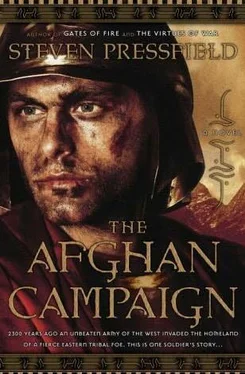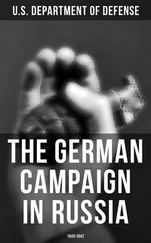Steven Pressfield - The Afgan Campaign
Здесь есть возможность читать онлайн «Steven Pressfield - The Afgan Campaign» весь текст электронной книги совершенно бесплатно (целиком полную версию без сокращений). В некоторых случаях можно слушать аудио, скачать через торрент в формате fb2 и присутствует краткое содержание. Жанр: Исторические приключения, на английском языке. Описание произведения, (предисловие) а так же отзывы посетителей доступны на портале библиотеки ЛибКат.
- Название:The Afgan Campaign
- Автор:
- Жанр:
- Год:неизвестен
- ISBN:нет данных
- Рейтинг книги:4 / 5. Голосов: 1
-
Избранное:Добавить в избранное
- Отзывы:
-
Ваша оценка:
- 80
- 1
- 2
- 3
- 4
- 5
The Afgan Campaign: краткое содержание, описание и аннотация
Предлагаем к чтению аннотацию, описание, краткое содержание или предисловие (зависит от того, что написал сам автор книги «The Afgan Campaign»). Если вы не нашли необходимую информацию о книге — напишите в комментариях, мы постараемся отыскать её.
The Afgan Campaign — читать онлайн бесплатно полную книгу (весь текст) целиком
Ниже представлен текст книги, разбитый по страницам. Система сохранения места последней прочитанной страницы, позволяет с удобством читать онлайн бесплатно книгу «The Afgan Campaign», без необходимости каждый раз заново искать на чём Вы остановились. Поставьте закладку, и сможете в любой момент перейти на страницу, на которой закончили чтение.
Интервал:
Закладка:
“Is that jackals or people?” Flea asks.
Lucas glances to me. “Jackals would sound more human.”
The evening is warm but we’re all shivering. In camp it is custom for rookies only to stand sentry; this night the vets take their turn too.
Sometime in the third watch an Afghan vixen is slain by two of Bullock’s grooms; she has crawled in, past the guard, all the way to the picketed horses, one of which she is in the act of hamstringing, just a pebble’s toss from the commander’s tent. Next morning, I and several others are detailed to remove the bodies of our countrymen to an even more secure site in the camp. We grab the first wrapped form to lift it; it plunges free of its shroud, in sections, at our feet. The man has been beheaded and cut off at the knees.
10
Our column returns to Artacoana to find the lower city abandoned and the upper city reduced to rubble. In our absence the natives have risen and been crushed. East in the hills, the siege of the Mother’s Breast is over. Alexander and his elite corps have already started south, into Drangiana, in pursuit of the rebel Barsaentes and the cavalry commander, Spitamenes.
It is Spitamenes’ men, we learn, whom our pursuit party has been chasing. The original massacre was his work. By his orders our luckless countrymen were betrayed; at his command were they turned over for mutilation.
He is clever, too, this villain. While our chase companies have spent themselves on his false trail into the desert, he himself has doubled back with his main force. He has led Artacoana into revolt.
Where is he now? Fled again.
I have never seen a city devastated. The lane where our boot-maker’s shop had stood is now stone and ash. The tannery district lies in ruins; kites and packs of wild dogs colonize the neighborhoods of the wealthy. Only the parks survive unscathed. Tent camps fill them; maids carrying water in earthen jugs shuttle back and forth to the river.
Our column of replacements still hasn’t linked with Alexander. We catch up instead with the heavy divisions under Craterus, which have returned to Artacoana, trailing Alexander. The siege train is just now loading out to move south; it is their artillery that has taken the city down. We inspect their handiwork. Half the city walls have been battered to powder; the timber mantlets remain, shielding the trenches from which our engineers and bucket-men have excavated their undermines. A dozen great stone-throwers, quarter-milers, lie burned and broken, the result apparently of sallies in force by the foe. The entire pine summit of the Mother’s Breast has been scorched to cinder.
Our outfit is given ten days to rest and refit. We are permitted to go up to the citadel and take a look. You can see where lanes have been barricaded by the foe with wagons and wicker hurdles. All are ash now. The successive ramparts, which are not stone but only mud-brick, lie beaten apart like children’s castles. Seared skeletons of the enemy litter rooms as black as the insides of smithies; your tread crunches over brittle bones.
We trek out, sightseers, to the Mother’s Breast. This is a spectacularly defensible outcrop, stronger than the city itself. Dense woods stud its flanks. Bluffs front the west. A dry course marks the eastern slope, which is less precipitous; two bridges span this. We can see where Alexander had these escape routes cut to trap the enemy, and where he massed his own troops along the cliffs. He waited for the wind to come round out of the west, then ordered his sappers to light off the dense, desiccated pines. He left an avenue of egress on the eastern flank, where the ground funneled the foe in flight into a rocky defile; he stationed his javelin men on the high ground close in and his cavalry on the flanks farther down. Their orders were to let no man escape. When the city fell the next day, our fellows put to the sword all males of military age and sold into slavery every woman and child.
Craterus has orders, now, to pay out the wider region for its complicity in the revolt. Our outfit is integrated into his corps. We will serve as blocking forces. Eleven villages line the valley. Our companies’ task is to cut off avenues of escape. Craterus’s men will take care of the villages.
I have never seen warriors as terrifying as these. They are of a whole order beyond Flag, Tollo, and Stephanos. They make no show of their prowess. This is work to them. These are veterans who learned their trade in the Balkan Wars under King Philip; they were old hands when Alexander was a child. Their arms broke Athens and Thebes and humbled mighty Sparta. Persia and her empire have fallen before them. The victories of the Granicus, Issus, and Gaugamela stand as their trophies; it is they who sacked Tyre and Gaza, captured Babylon and Susa and Persepolis.
These Afghan villages are scrap meat to them. They cordon two in a morning and scorch them to ashes by noon. The foe falls before them like wheat. It does the enemy no good to hide in garner or grain crib; Craterus’s men drag him forth and gut him where he stands. Village elders confront them in indignation, cursing the invaders in a tongue they can’t understand and care nothing for. The Macks drive them to their knees and butcher them like hogs. It is farmer’s work. Slaughter.
Lucas and I look on in horror from our posts on the perimeter. Most appalling is the outcry of the women, rounded up for the slavers’ train. The dames howl like animals; nothing can make them stop. Prayers to heaven ascend amid swirling dust and columns of black smoke. We herd the fugitives like cattle. Those that get away, we leave for wolves and crows. Mute urchins gape with eyes dark as death, while black-cawled crones lift palms to the Almighty to call down damnation upon us.
The operation takes eleven days. When we return to Artacoana, the engineers have laid out a new city. The metropolis, to be called Alexandria-in-Areia, is a model of our young king’s shrewdness and of his reckoning of the weakness and cupidity of the foe.
All Afghans look alike to us scuffs; we can’t tell one from another. But Alexander calculates more cannily. He sees this country as a devil’s barnyard of contending clans and khels, who have warred with each other for centuries. The tribes of southern Areia have long coveted this valley, which has been held, beneath Persian sway, by their hated northern rivals. Why not let the new kickers have a crack at it? Why should we Macks spend blood and treasure to suppress the aboriginals? Let their foes do it for us.
Alexander puts out the call, not only for masons, carpenters, and teamsters, to whom he promises work at wages unheard-of in these kingdoms, but for settlers and pioneers as well. To these he pledges land and pasturage, rights of way, warrants of exclusivity for trade and commerce. The southern tribes flood in, delirious at the prospect of lording it over their northern adversaries. Within days the construction site is overrun with every able-bodied tribesman in the region and half the respectable women, who serve as cooks and tailors, laundresses, nurses, vendors, seamstresses (a vital function, sewing tents and pack covers, ground rolls, straps, and panniers). Dispossessed females flock here too, peshnarwan, “those left behind,” to perform such services as their more fortunate sisters will not.
Our king’s scheme works. What had been, days before, the site of a grisly valley-wide massacre has become a burgeoning boomtown. New arrivals have displaced the old, all owing their good fortune to Alexander. Jobs are plentiful. Pay and hopes are high. By art as much as by might, our king has brought the country to its knees.
Those elements of the army not employed in providing security for the construction, which means us (Craterus’s brigades having marched south to overhaul Alexander and the elite elements), are kept busy on night raids, mopping up the last of the resistance. We strike downvalley, the same villages Craterus’s men devastated before, where Afghan sons who have taken to the hills return after dark to visit their wives and mothers, to have wounds tended, and to get food or news. We kick down their gates and drag them into the dark. Orders have been issued not to put captives to the sword in front of their women. Better to haul them off into the desert, leaving their ends unknown; this produces a more abiding terror because of the natives’ belief in djinns and demons. The scent of blood draws wolves, who scavenge the corpses. The packs learn to follow us. Their yellow eyes glitter in the torchlight. They cannot be driven off, even when pelted with stones.
Читать дальшеИнтервал:
Закладка:
Похожие книги на «The Afgan Campaign»
Представляем Вашему вниманию похожие книги на «The Afgan Campaign» списком для выбора. Мы отобрали схожую по названию и смыслу литературу в надежде предоставить читателям больше вариантов отыскать новые, интересные, ещё непрочитанные произведения.
Обсуждение, отзывы о книге «The Afgan Campaign» и просто собственные мнения читателей. Оставьте ваши комментарии, напишите, что Вы думаете о произведении, его смысле или главных героях. Укажите что конкретно понравилось, а что нет, и почему Вы так считаете.












